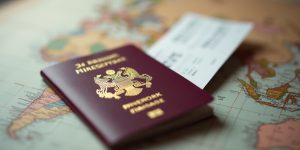Missing a flight can disrupt your travel plans and create stress for any traveler. Whether it’s due to traffic, long security lines, or misreading your boarding time, arriving late at the gate can quickly turn an exciting trip into a stressful situation.
But don’t worry, knowing what happens if you miss your flight and understanding airline procedures can help you recover quickly. In this guide, we’ll explain your passenger rights, what to do immediately, and five practical steps to get back on track smoothly.
Quick Snapshot: What to Expect If You Miss Your Flight
Here’s a quick look at common outcomes and your potential options:
| Situation Type | What Typically Happens | Rebooking Cost | Airline Policy Factors In |
|---|---|---|---|
| Domestic flight, same-day | May be rebooked for free or a small fee | Low/None | Airline flexibility |
| International flight | Rebooking often requires a new ticket | High | Fare rules, visa issues |
| Missed connection (same airline) | Airline usually rebooks at no charge | Free | If the delay was the airline’s fault |
| No-show (completely missed) | The ticket may be forfeited | Full cost lost | Strict airlines penalise |
| Arrived late due to emergencies | Some airlines may assist with rebooking | Varies | Documentation may help |
Most airlines distinguish between passengers who communicate their delay versus complete no-shows, with better treatment typically given to those who proactively contact the airline.
Check your card’s travel protection benefits and keep receipts for potential reimbursement claims.
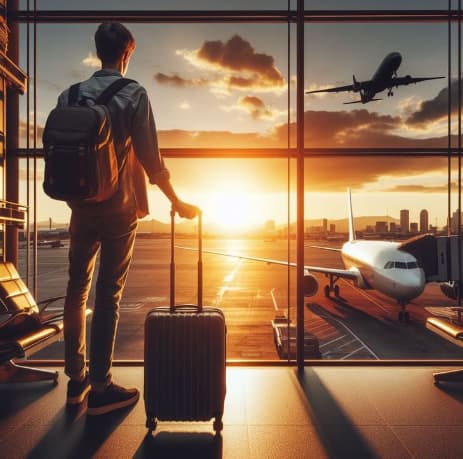
Understanding these scenarios helps set realistic expectations for rebooking costs and success rates.
Immediate Actions When You Miss Your Flight
Here’s what you need to do instantly in case the worst happens!
1. Always notify the airline ASAP
Contact your airline immediately through their app, phone, or customer service desk.
Quick communication often leads to better rebooking options and demonstrates that you’re actively trying to resolve the situation rather than simply being a no-show passenger.
2. Check if you’re eligible for same-day standby
Many airlines offer same-day standby options for missed flights, especially on popular routes with multiple daily departures.
This can be significantly cheaper than purchasing a new ticket and gets you to your destination faster.
3. Know your fare class—flexible tickets offer more options
Premium fare classes and flexible tickets typically include free rebooking privileges. Basic economy passengers often face stricter policies and higher rebooking fees, making it essential to understand the terms of your ticket before traveling.
4. Use airline apps to manage rebooking
Most major airlines allow rebooking through their mobile apps, often with lower fees than phone or counter service.
These apps also show real-time availability and pricing for alternative flights.
5. Credit card travel perks might cover rebooking fees
Premium credit cards often include trip interruption benefits that can reimburse rebooking fees.
Flight Rebooking Options And Airline Policy Details
If you miss your flight, understanding your rebooking options and how airlines handle such situations can help you take the next step with confidence.
Let’s break it down by process, cost, and available alternatives.
Airline Rebooking Process
Airlines typically process rebooking through their customer service desks, phone lines, or mobile apps.
The process involves checking availability on subsequent flights, applying applicable fees based on your fare class, and issuing new boarding passes.
Response times vary significantly between airlines and during peak travel periods.
Rebooking Fees And Costs
Rebooking fees range from zero to several hundred dollars, depending on your ticket type, destination, and airline policy.
Domestic flights often have lower rebooking costs, while international routes may require purchasing entirely new tickets.
Premium passengers and elite status holders frequently receive fee waivers.
Alternative Flight Options
When your original flight is missed, airlines may offer seats on partner airlines, alternative routing through different cities, or next-day departures.
These alternatives might involve longer travel times or additional connections, but can be more cost-effective than waiting for direct flights.
What Is The “Flat Tire Rule”
Many airlines have an unofficial “flat tire rule” that provides flexibility for passengers who miss flights due to circumstances beyond their control.
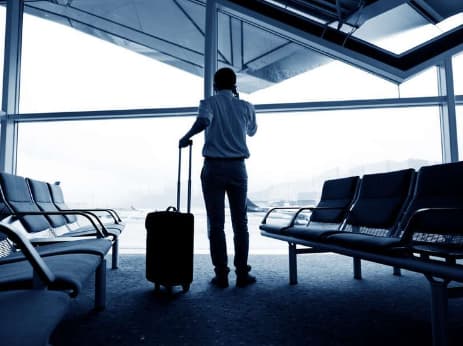
This unwritten policy allows gate agents discretionary power to rebook passengers without fees when genuine emergencies occur, though it’s not guaranteed and varies by airline and situation.
Different Scenarios And Their Consequences
Missing a flight doesn’t always lead to the same outcome; what happens next largely depends on why you missed it.

Here’s how different scenarios impact your rebooking options and potential costs.
Missing Flight Due to Airline Fault
When airlines cause delays through mechanical issues, crew problems, or operational failures, they’re typically responsible for rebooking passengers at no additional cost.
This includes providing meal vouchers, hotel accommodations for overnight delays, and priority placement on subsequent flights with available seats.
Missing Flight Due to Personal Reasons
Personal delays like oversleeping, traffic, or late arrival at the airport result in passengers bearing full responsibility for rebooking costs.
Airlines treat these as passenger-caused missed flights, applying standard rebooking fees and policies based on the original ticket’s fare rules and restrictions.
Missing Flight After Check-in
Passengers who check in but miss their flight face different consequences than complete no-shows.
Airlines may still cancel connecting flights or return segments, but rebooking options are often more favourable since the passenger demonstrated intent to travel by completing check-in procedures.
Missing Flight Due To Security Check Issues
Extended security screening, TSA delays, or security-related hold-ups are generally considered passenger responsibility unless caused by extraordinary airport circumstances.
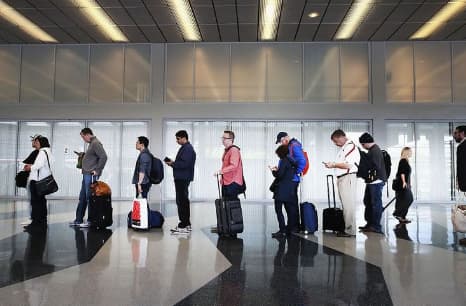
However, some airlines show flexibility when passengers can document unusual security delays or airport-wide issues that affect multiple travellers.
Can Travel Insurance Cover A Missed Flight?
Travel insurance may cover missed flights when the cause falls within policy parameters, such as medical emergencies, severe weather, or documented traffic accidents.
However, routine delays, oversleeping, or poor planning typically aren’t covered, making it essential to understand your policy’s specific terms and exclusions.
What Happens If You Miss Your Connecting Flight?
Missing a connecting flight can be frustrating, but the outcome depends on who caused the delay and how your tickets were booked.
Here’s what to expect in different connection-related situations.
Missed Connection Due to the Airline
When airlines cause missed connections through delayed incoming flights, they must rebook passengers on the next available flight at no charge.
This includes providing accommodations, meals, and ground transportation when overnight stays are required, as well as compensation in certain international travel situations.
Missed Connection with Different Airlines
Separate airline bookings create complications when connections are missed, as each airline only handles its portion of the journey.
Passengers may need to purchase new tickets for continuing segments, making travel insurance or flexible bookings particularly valuable for multi-airline itineraries.
Short Layover Situations
Tight connections increase missed flight risks, especially when departing flights are delayed.
Airlines generally won’t guarantee connections under their minimum connection times, but they may offer flexibility when their scheduling creates unrealistic transfer windows or when delays occur.
If you’re curious about the endurance of modern air travel, check out this detailed guide on the longest flight in the world to learn about routes, durations, and what to expect on these epic journeys.
Baggage Handling When You Miss A Flight
When you miss a flight, your baggage doesn’t always follow a simple path.
How your luggage is handled depends on whether the trip is international, domestic, or involves connecting flights.
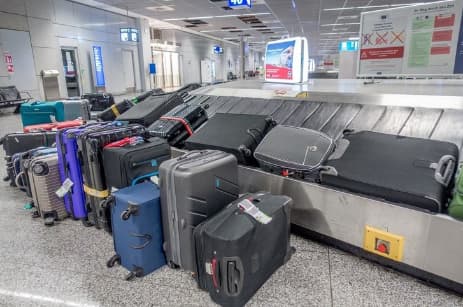
Here’s what you need to know.
International Flights
International baggage regulations require careful coordination when flights are missed, as customs and security protocols may necessitate bag retrieval and re-checking.
Airlines typically hold baggage for rebooking within 24-48 hours, but longer delays may require passenger intervention to prevent bags from being returned to the origin.
Domestic Flights
Domestic baggage handling is generally more straightforward when flights are missed, with airlines automatically transferring bags to rebooked flights.
However, passengers should confirm baggage transfer arrangements during rebooking to prevent bags from travelling to the original destination without them.
Connecting Flight Baggage
Missed connections can complicate baggage handling, particularly when connections involve different airlines or international segments.
Airlines may automatically reroute checked bags, but passengers should verify transfer arrangements and obtain baggage service contact information for tracking purposes.
Airline Policies for Missed Flights
Different airlines have varying rules when a passenger misses a flight. Knowing their rebooking options, standby policies, and grace periods can help you act quickly and reduce extra fees.
| Airline | Rebooking Options | Standby Policy | Grace Period | Notes / Fees |
|---|---|---|---|---|
| Garuda Indonesia | Free rebooking if reported immediately; paid options otherwise | Limited standby available for same-day flights | 30–60 mins | Extra fees may apply for different ticket class; contact customer service promptly |
| Lion Air | Can rebook for a fee; priority rebooking depends on ticket type | Standby allowed at counter if seats available | 30 mins | Low-cost carrier, so fees may be higher for missed flights |
| AirAsia | Paid rebooking via website/app; refundable only for flex tickets | Standby only for same-day flight, subject to availability | 15–30 mins | Charges apply; travel insurance may cover emergencies |
| Citilink | Free rebooking if notified within 1 hour; paid after | No guaranteed standby | 30 mins | Fees vary by ticket type; customer service recommended |
| Sriwijaya Air | Paid rebooking | Standby limited; depends on seat availability | 30 mins | Fees can be significant for missed flights |
Tips for Travelers
- Check your airline’s official website or app for up-to-date policies.
- Call customer service immediately to secure rebooking or a standby seat.
- Consider travel insurance for coverage in case of emergencies.
- Keep documents ready: boarding pass, ticket receipt, ID/passport.
Refunds and Compensation When You Miss Your Flight
While missing a flight usually means losing your ticket’s value, there are cases where refunds or compensation may still apply.
Standard Refund Policy
Airlines rarely provide full refunds for missed flights unless passengers hold fully refundable tickets or qualify under specific circumstances.
Most tickets are non-refundable, meaning passengers forfeit the fare value when they miss flights, though taxes and fees might be recoverable.
Exceptions for Refunds
Refund exceptions include medical emergencies with documentation, military deployment orders, jury duty summons, or death in the immediate family.
Some airlines also consider weather-related emergencies or documented transportation failures as valid reasons for refund consideration beyond standard policies.
Compensation Rights
Passenger compensation rights vary significantly by region, with European Union regulations providing stronger protections than US domestic policies.
Compensation typically applies when airlines cause delays or cancellations, but passengers who miss flights due to personal reasons generally aren’t entitled to monetary compensation.
10 Tips to Make Sure You Never Miss A Flight
Never miss a flight again with these 10 smart, stress-saving travel tips.
- Arrive at the airport 2-3 hours early for international flights, 1-2 hours early for domestic flights.
- Check in online 24 hours before departure and download mobile boarding passes.
- Monitor traffic conditions and plan alternative routes to the airport.
- Set multiple alarms and confirm your departure time the night before.
- Consider staying at an airport hotel for very early morning flights.
- Download airline apps for real-time gate and timing updates.
- Pack carry-on essentials in case checked baggage doesn’t make connections.
- Build buffer time between connecting flights, especially in large airports.
- Sign up for flight status notifications via text or email alerts.
- Keep important documents easily accessible and verify passport expiration dates.
Statistics: How Common Is Missing a Flight?
Missing a flight happens more often than you’d think. Studies show that around 2% to 5% of travelers miss their flights each year. The top reasons include traffic delays, long security lines, gate changes, and misreading boarding times. A recent survey found that 1 in 10 travelers has missed at least one flight in the last three years, with solo and younger travelers being the most affected.
Passenger Rights & Steps if You Miss a Flight
- Rebooking & Fees: Most airlines allow rebooking; fees vary by ticket type.
- EU Rights: EC 261 may cover airline-caused missed connections.
- Travel Insurance: Check if it covers missed flights due to unforeseen events.
- Compensation: Usually not for personal misses; airline delays may qualify.
- Proactive Steps: Contact the airline, know policies, consider travel insurance.
Related Read:
Final Steps if You Miss Your Flight
Missing a flight can be stressful, but it doesn’t have to derail your travel plans. Airlines offer rebooking and standby options, though flexibility and costs depend on your ticket type and circumstances.
The most important thing is to stay calm, contact the airline immediately, and understand your options. Remember, missing a flight happens to many travelers, and airline staff are trained to help you get back on track.
By following these steps, you can recover quickly and continue your journey with minimal disruption.
FAQs
Immediately contact your airline’s customer service or help desk.
Sometimes, especially on domestic flights or if it’s the airline’s fault.
Refunds are rare unless you have a refundable ticket or a valid reason.
Only if your reason aligns with the policy (e.g., illness, traffic accident).
Some airlines cancel return legs if you’re a no-show. Always notify them.
You may lose your seat, be denied boarding, or get bumped to a later flight, and won’t receive a boarding pass.
Eligibility for a refund, compensation, or rebooking depends on why you missed the flight, your airline’s policy, and sometimes the discretion of airport staff.



